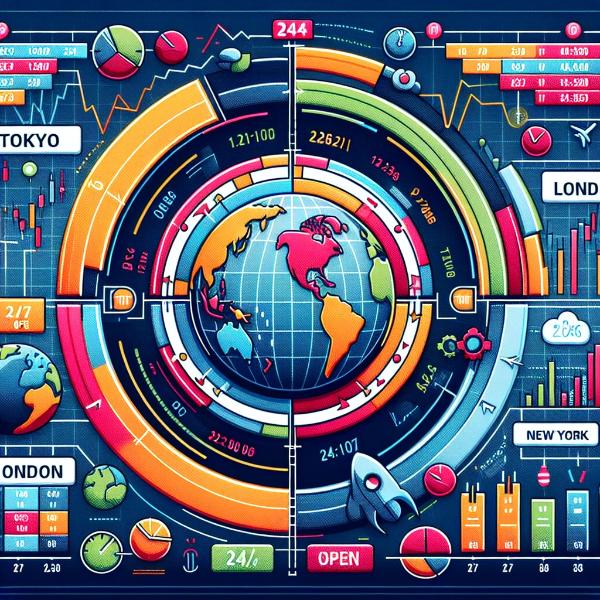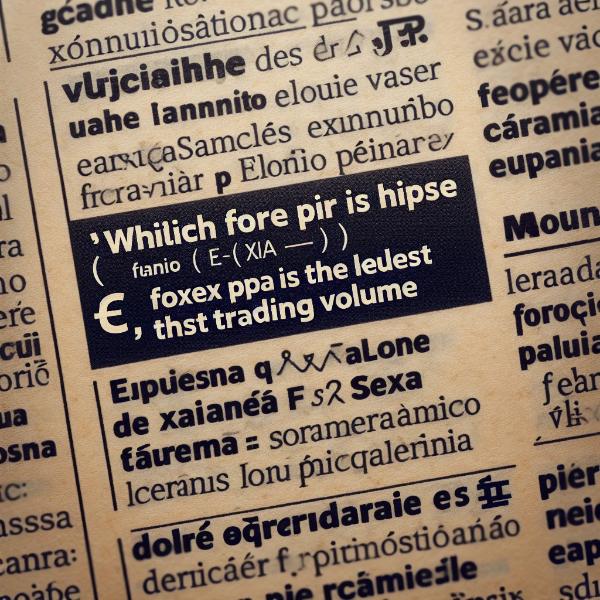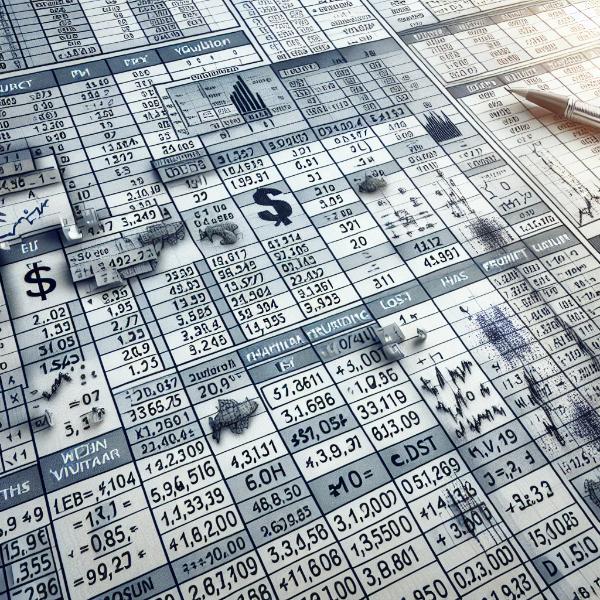Is Forex Open: Learn About Forex Trading Hours and Market Availability
Are you interested in Forex trading? Do you want to know when the Forex market is open and available for trading? Look no further! We have all the information you need to become a successful Forex trader.
Forex trading is a global decentralized market where currencies are traded. It operates 24 hours a day, five days a week, making it one of the most liquid and accessible markets in the world. However, it’s important to understand the trading hours and market availability to maximize your trading opportunities.
During the week, the Forex market opens on Sunday at 10:00 PM (GMT) and closes on Friday at 10:00 PM (GMT). This means that you can trade currencies at any time during these hours, depending on your trading strategy and time zone.
But why is it important to know the trading hours? Well, different currency pairs have different levels of liquidity and volatility at different times. For example, the London session (3:00 AM to 12:00 PM GMT) is known for its high trading volume, while the Tokyo session (12:00 AM to 9:00 AM GMT) is known for its volatility.
By understanding the Forex trading hours, you can plan your trades accordingly and take advantage of the most favorable market conditions. Whether you’re a beginner or an experienced trader, knowing when the Forex market is open is crucial for your success.
So, if you’re ready to dive into the world of Forex trading, start by learning about the trading hours and market availability. With the right knowledge and strategy, you can unlock the potential of the Forex market and achieve your financial goals.
Understanding the Forex Market
The Forex market, also known as the foreign exchange market, is the largest and most liquid financial market in the world. It operates 24 hours a day, five days a week, allowing traders to buy and sell currencies from different countries.
Unlike other financial markets, such as the stock market, the Forex market does not have a physical location. Instead, it is a decentralized market where participants trade currencies electronically through a network of banks, financial institutions, and individual traders.
The main participants in the Forex market are central banks, commercial banks, hedge funds, multinational corporations, and individual retail traders. Each participant plays a different role in the market, with central banks having the most influence due to their ability to control interest rates and monetary policy.
One of the key features of the Forex market is its high liquidity. With an average daily trading volume of over $5 trillion, there is always a buyer and a seller for every currency pair. This high liquidity ensures that traders can enter and exit positions quickly, without significant price fluctuations.
Another important aspect of the Forex market is its global nature. As it operates across different time zones, the market is open 24 hours a day, starting with the Asian session, followed by the European session, and then the American session. This allows traders from around the world to participate at any time, providing ample trading opportunities.
Understanding the Forex market requires knowledge of various factors that influence currency prices. These factors include economic indicators, geopolitical events, central bank announcements, and market sentiment. Traders analyze these factors to make informed trading decisions and predict future price movements.
In conclusion, the Forex market is a dynamic and global marketplace where currencies are traded. Its decentralized nature, high liquidity, and 24-hour availability make it an attractive market for traders. By understanding the factors that influence currency prices, traders can navigate the Forex market and potentially profit from their trades.
What is Forex?
Forex, short for Foreign Exchange, is the global marketplace for trading currencies. It is the largest and most liquid financial market in the world, with an average daily trading volume of over $5 trillion. Forex trading involves buying one currency and selling another simultaneously, with the aim of making a profit from the fluctuations in exchange rates.
The forex market operates 24 hours a day, 5 days a week, allowing traders to participate in trading activities at any time. This is because the forex market is decentralized, with no central exchange or physical location. Instead, trading is conducted electronically over-the-counter (OTC), through a network of banks, financial institutions, and individual traders.
Forex trading offers numerous advantages, including high liquidity, low transaction costs, and the ability to profit from both rising and falling markets. It also provides opportunities for traders to leverage their capital, meaning they can control larger positions with a smaller amount of invested capital. However, it is important to note that forex trading involves risks, and traders should have a solid understanding of the market and risk management strategies.
Overall, forex trading offers individuals and institutions the opportunity to participate in the global currency market and potentially generate profits through speculation on exchange rate movements.
Importance of Forex Trading Hours
Forex trading hours play a crucial role in the success of any trader. The forex market operates 24 hours a day, 5 days a week, allowing traders to participate in the market at any time. Understanding the importance of trading hours can help traders make informed decisions and maximize their profits.
One of the key advantages of the forex market is its liquidity. The market is highly liquid, meaning there is a high volume of trading activity and a large number of participants. This liquidity is influenced by the trading hours of different financial centers around the world. As one market closes, another one opens, ensuring that there is always a market open for trading.
Knowing the trading hours of different markets is essential for traders as it allows them to take advantage of the overlaps between different sessions. During these overlaps, there is increased trading activity and volatility, which can lead to more profitable trading opportunities. For example, the overlap between the London and New York sessions is known for its high trading volume and volatility, making it an ideal time for active traders.
Furthermore, understanding the trading hours can help traders avoid periods of low liquidity and reduced trading opportunities. For instance, during weekends or holidays, when major financial centers are closed, trading activity tends to be lower, resulting in less volatility and fewer trading opportunities. By being aware of these periods, traders can adjust their trading strategies accordingly.
Additionally, trading hours can also impact the execution of trades. During periods of high trading volume, such as during major economic announcements or news releases, the market can become more volatile, leading to slippage or delays in trade execution. Traders need to be aware of these periods and adjust their trading strategies accordingly to minimize potential risks.
In conclusion, understanding and taking advantage of forex trading hours is essential for any trader. By knowing when different markets are open and when there are overlaps between sessions, traders can maximize their trading opportunities and profits. Additionally, being aware of periods of low liquidity and high volatility can help traders avoid potential risks. Therefore, it is crucial for traders to stay informed about the forex trading hours and market availability.
Factors Affecting Forex Trading Hours
Forex trading hours are influenced by various factors that determine the availability and liquidity of the market. Understanding these factors is crucial for traders to effectively plan their trading activities and maximize their potential profits. Here are some key factors that affect forex trading hours:
- Time Zones: The forex market operates 24 hours a day, five days a week, due to the global nature of currency trading. Different time zones around the world affect the trading hours, as trading sessions overlap in certain regions, leading to increased market activity and liquidity.
- Major Financial Centers: The forex market is heavily influenced by the opening and closing times of major financial centers such as London, New York, Tokyo, and Sydney. These centers have a significant impact on market liquidity and volatility during their respective trading hours.
- Economic Events: Important economic events, such as central bank announcements, economic data releases, and geopolitical developments, can significantly impact forex trading hours. Traders often anticipate and react to these events, leading to increased volatility and trading opportunities.
- Seasonal Factors: Seasonal factors, such as holidays and vacation periods, can affect forex trading hours. During holidays, trading volumes may decrease, leading to lower liquidity and potentially wider spreads. Traders should be aware of these seasonal factors and adjust their trading strategies accordingly.
- Market Overlaps: Trading hours often overlap between different trading sessions, such as the European and North American sessions. These overlaps can result in increased trading activity and liquidity, providing traders with more opportunities to enter and exit positions.
By understanding and considering these factors, traders can make informed decisions about when to trade and which currency pairs to focus on. It is important to stay updated on market news and events that may affect forex trading hours to optimize trading strategies and achieve desired results.
Forex Trading Sessions
Forex trading sessions are the different time periods during which the forex market is open for trading. The forex market operates 24 hours a day, 5 days a week, allowing traders to participate in the market at any time. However, the market is not equally active throughout the entire day.
There are four main forex trading sessions:
1. Sydney Session: The Sydney session starts at 10:00 PM GMT and ends at 7:00 AM GMT. This session is known for its relatively low volatility and liquidity compared to other sessions. It is often considered as the calm before the storm, as it overlaps with the Tokyo session.
2. Tokyo Session: The Tokyo session starts at 12:00 AM GMT and ends at 9:00 AM GMT. This session is known for its high liquidity and volatility, as it overlaps with the Sydney session and the European session. Many traders consider this session as the best time to trade the JPY currency pairs.
3. London Session: The London session starts at 8:00 AM GMT and ends at 5:00 PM GMT. This session is considered the most active and liquid session, as it overlaps with both the Tokyo session and the New York session. The majority of forex trading volume is generated during this session, making it an ideal time for traders to enter and exit trades.
4. New York Session: The New York session starts at 1:00 PM GMT and ends at 10:00 PM GMT. This session is known for its high liquidity and volatility, as it overlaps with the London session. It is considered the second most active session after the London session.
It is important for traders to be aware of these trading sessions, as the market conditions and trading opportunities can vary during each session. By understanding the characteristics of each session, traders can plan their trading strategies accordingly and take advantage of the most favorable trading conditions.
Note: The timings mentioned above are based on GMT (Greenwich Mean Time). Traders should adjust the timings according to their local time zone and daylight saving time changes.
Asian Session
The Asian session is the first major trading session in the forex market. It starts at 00:00 GMT and ends at 09:00 GMT. During this session, the major financial centers in Asia, such as Tokyo, Hong Kong, and Singapore, are active.
The Asian session is known for its relatively low volatility compared to the other trading sessions. However, there are still opportunities for traders to profit from the market movements during this time. The Asian session overlaps with the European session for a few hours, which can lead to increased trading activity and volatility.
Traders who focus on the Asian session often pay close attention to economic data and news releases from countries in the region, such as Japan, China, and Australia. These announcements can have a significant impact on the currency pairs involving the respective currencies.
It’s important to note that not all currency pairs are equally active during the Asian session. The most actively traded pairs during this time are the ones involving the Japanese yen (JPY), such as USD/JPY and EUR/JPY.
Overall, the Asian session provides traders with unique trading opportunities and is an important part of the 24-hour forex market. Understanding the characteristics and dynamics of this session can help traders make informed trading decisions.
European Session
The European session is one of the major trading sessions in the forex market. It starts at 8:00 AM GMT and overlaps with the Asian session for a few hours. The European session is known for its high liquidity and volatility, as it includes the trading activities of major financial centers such as London, Frankfurt, and Paris.
During the European session, traders closely monitor economic news releases and events that can impact the European markets. Key economic indicators such as GDP, inflation rates, and central bank decisions can significantly influence currency prices. Traders analyze these factors to make informed trading decisions and capitalize on potential opportunities.
The European session is characterized by active trading in major currency pairs such as EUR/USD, GBP/USD, and USD/CHF. The high trading volume and liquidity during this session provide traders with ample opportunities to enter and exit trades at favorable prices.
It is important to note that the European session is not limited to European traders only. Traders from around the world actively participate in this session, making it a truly global market. The European session also sets the tone for the rest of the trading day, as it often influences the trading sentiment in other sessions, such as the American session.
Overall, the European session is a crucial time for forex traders, offering them the opportunity to trade major currency pairs with high liquidity and volatility. Traders should stay updated with the latest market news and economic events to make informed trading decisions during this session.
Question-Answer:
What is Forex trading?
Forex trading is the buying and selling of currencies on the foreign exchange market. Traders aim to profit from fluctuations in exchange rates by making trades based on their predictions of future currency movements.
What are the trading hours for Forex?
The Forex market is open 24 hours a day, 5 days a week. It starts with the opening of the Asian session on Sunday evening and ends with the closing of the New York session on Friday afternoon. However, trading activity and liquidity can vary depending on the time of day and the currency pairs being traded.
Can I trade Forex on weekends?
No, the Forex market is closed on weekends. Trading activity is generally low during this time as most major financial institutions and traders are not active. However, some brokers may offer limited trading options during weekends for certain currency pairs.
What is the best time to trade Forex?
The best time to trade Forex depends on various factors such as the currency pairs being traded, market volatility, and personal trading preferences. Generally, the most active and liquid trading hours occur during the overlap of the London and New York sessions, which is between 8:00 AM and 12:00 PM EST.
Is Forex trading available 24/7?
While the Forex market is open 24 hours a day, it is not equally active throughout the entire day. Trading activity and liquidity can vary depending on the session and the currency pairs being traded. It is important to note that trading outside of the most active hours may result in lower liquidity and wider spreads.
What is Forex trading?
Forex trading, also known as foreign exchange trading, is the process of buying and selling currencies on the global market. It allows individuals and institutions to profit from fluctuations in exchange rates.
What are the trading hours for Forex?
The Forex market is open 24 hours a day, 5 days a week. It starts with the opening of the Sydney session on Monday morning and ends with the closing of the New York session on Friday afternoon.
Can I trade Forex on weekends?
No, the Forex market is closed on weekends. However, there are some exceptions, such as the cryptocurrency market, which operates 24/7.
What are the major Forex trading sessions?
The major Forex trading sessions are the London session, the New York session, the Tokyo session, and the Sydney session. These sessions overlap at certain times, creating periods of increased trading activity.
Is Forex trading available to everyone?
Yes, Forex trading is available to anyone with access to the internet and a trading account. However, it is important to note that trading Forex involves risks and it is recommended to educate yourself and practice with a demo account before trading with real money.
What is Forex trading?
Forex trading, also known as foreign exchange trading, is the buying and selling of currencies on the foreign exchange market. Traders aim to profit from the fluctuations in exchange rates between different currencies.
What are the trading hours for Forex?
The Forex market is open 24 hours a day, 5 days a week. It starts on Sunday at 10:00 PM GMT and ends on Friday at 10:00 PM GMT. However, different currency pairs may have different trading hours, so it’s important to check the specific trading hours for the currency pairs you are interested in.
Can I trade Forex on weekends?
No, the Forex market is closed on weekends. However, there are some exceptions, such as the cryptocurrency market, which is open 24/7. It’s important to note that trading volumes are usually lower on weekends, which can result in less liquidity and higher spreads.
What is the best time to trade Forex?
The best time to trade Forex depends on various factors, such as the currency pairs you are trading and your trading strategy. Generally, the most active trading hours occur during the overlap of the London and New York trading sessions, which is from 8:00 AM to 12:00 PM EST. During this time, there is usually higher volatility and trading opportunities.
Can I trade Forex at night?
Yes, you can trade Forex at night, as the Forex market is open 24 hours a day. However, it’s important to note that trading volumes and liquidity are usually lower during the Asian trading session, which can result in wider spreads and potentially less trading opportunities.
What is Forex trading?
Forex trading, also known as foreign exchange trading, is the buying and selling of currencies on the foreign exchange market. Traders aim to make a profit by speculating on the value of one currency compared to another.
What are the trading hours for Forex?
The Forex market is open 24 hours a day, 5 days a week. The trading week starts on Sunday at 10 PM GMT and ends on Friday at 10 PM GMT. However, different currency pairs have different trading hours, so it’s important to check the specific trading hours for the currency pairs you are interested in.
Can I trade Forex on weekends?
No, the Forex market is closed on weekends. Trading activity is generally low during weekends, as most financial institutions and traders are not active. The market opens again on Sunday at 10 PM GMT.





